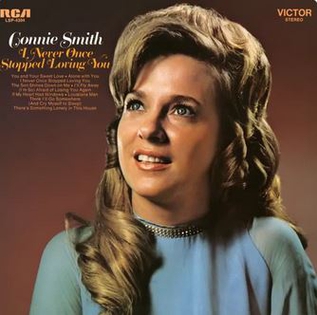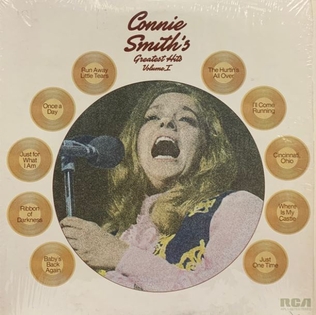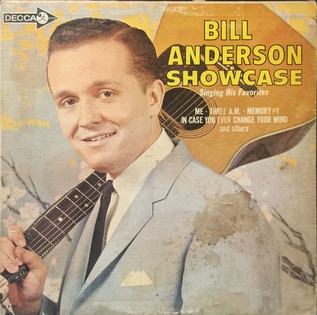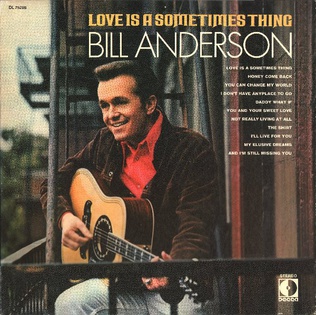
Connie Smith is an American country music singer and songwriter. Her contralto vocals have been described by music writers as significant and influential to the women of country music. A similarity has been noted between her vocal style and the stylings of country vocalist Patsy Cline. Other performers have cited Smith as influence on their own singing styles, which has been reflected in quotes and interviews over the years.

James William Anderson III, known professionally as Bill Anderson, is an American country music singer, songwriter, and television host. His soft-spoken singing voice was given the nickname "Whispering Bill" by music critics and writers. As a songwriter, his compositions have been covered by various music artists since the late 1950s, including Ray Price and George Strait.

Elizabeth Jane Anderson was an American country music singer-songwriter who was one in a wave of new-generation female vocalists in the genre during the 1960s to write and record her own songs on a regular basis. Writing in The New York Times Bill Friskics-Warren noted, "Like her contemporary Loretta Lynn, Ms. Anderson gave voice to female survivors; inhabiting their struggles in a soprano at times alluring, at times sassy."

"Once a Day" is a song written by Bill Anderson and recorded as the debut single by American country artist Connie Smith. It was produced by Bob Ferguson for her self-titled debut album. The song was released in August 1964, topping the Billboard country music chart for eight weeks between late 1964 and early 1965. It was the first debut single by a female artist to reach number one on the Billboard Hot Country Songs. This song peaked at number one for the week of November 28, 1964, and it stayed at number one for eight consecutive weeks, a record for a female solo artist for nearly 50 years, until it was surpassed by Taylor Swift's "We Are Never Ever Getting Back Together" in December 2012.

Cute 'n' Country is the second studio album by American country music artist Connie Smith. It was released in October 1965 via RCA Victor Records and contained 12 tracks. Cute 'n' Country contained a mixture of original songs and cover versions by other country artists. Featured on the album was the top ten single "I Can't Remember". Cute 'n' Country was Smith's second album to top the Billboard country LP's chart.
"I Can't Remember" is a song written by Bill and Bette Anderson, and recorded as a single by American country artist, Connie Smith. It was produced by Bob Ferguson and was released on her 1965 album, Cute 'n' Country. The song was released in April 1965, reaching the Top 5 on the Billboard country music chart, becoming her third Top 10 hit. It was Smith's third single released under the RCA Victor label.

Connie Smith is the debut studio album by American country music artist Connie Smith. It was released in March 1965 on RCA Victor Records and was produced by Bob Ferguson. The album included Smith's debut single, "Once a Day". The song became her signature recording and biggest hit, reaching number one on the Billboard country songs chart.

Connie Smith Sings Bill Anderson is the eighth studio album by American country singer Connie Smith. It was released in May 1967 via RCA Victor and featured 12 tracks. The album was dedicated to her mentor, Bill Anderson. It contained several songs made popular by Anderson himself, along with several tracks made popular by other performers. It also included the newly-recorded "Cincinnati, Ohio". Smith released her version as a single, which climbed into the top five of the American country songs charts. The album received favorable reviews following its release.

The Best of Connie Smith is a compilation album by American country singer Connie Smith. It was released in September 1967 via RCA Victor and featured 12 tracks. The disc was Smith's first compilation project released in her career and featured her most popular singles made commercially successful between 1964 and 1967. It also featured one new recording titled "I'll Come Runnin'". Penned by Smith herself and released as a single, the song became a top ten hit on the American country songs chart in 1967.

I Never Once Stopped Loving You is the fourteenth solo studio album by American country singer Connie Smith. It was released in September 1970 on RCA Victor and contained ten tracks. The collection mixed original material with covers of previously-recorded songs. Three singles were included on the album: "You and Your Sweet Love", the title track and "Louisiana Man". Both "You and Your Sweet Love" and the title track reached the top ten on the American country songs chart in 1970. The album itself charted in the top 20 of the American country LP's survey. Billboard magazine gave the LP a positive response following its original release.

Connie Smith's Greatest Hits, Vol. I is a compilation album by American country singer Connie Smith. It was released in October 1973 via RCA Victor and contained ten tracks. The disc was one of several compilations released following Smith's departure from the RCA label. It included ten of Smith's most popular singles from her career, such as the number one single, "Once a Day", and top ten single, "The Hurtin's All Over". The album charted on the American country LP's chart in 1973 and received a positive review from Billboard magazine.

I Don't Wanna Talk It Over Anymore is the twenty-eight solo studio album by American country singer Connie Smith. It was released in October 1976 and contained ten tracks. The project's name was derived from the title track, which was one of three singles included. Its other single releases included a cover The Everly Brothers's "So Sad " and an original tune called "The Latest Shade of Blue". The title track was the album's most successful single, placing in the top 20 of the American country songs chart. The album received a positive response from Billboard magazine following its release. It was also Smith's final studio project released with the Columbia label.
"Then and Only Then" is a song written by Bill Anderson and recorded by the American country artist, Connie Smith, on her Connie Smith. It was produced by Bob Ferguson and released in January 1965, reaching the Top 5 on the Billboard country music chart in early 1965, becoming her second major hit. It was her follow-up single to her multi-week number one hit, "Once a Day", which was released the previous year.
"Ribbon of Darkness" is a song written by Gordon Lightfoot that was released in 1965 as a single by Marty Robbins. The song was Robbins' eleventh number one on the U.S. country singles chart, where it spent one week at the top and a total of nineteen weeks on the chart.
"If I Talk to Him" is a song written by Dolores Edgin and Priscilla Mitchell, and released as a single by American country artist Connie Smith. It was produced by Bob Ferguson and released on her 1966 studio album Miss Smith Goes to Nashville. The song was released in August 1965 and reached the Top 5 on the Billboard Magazine country music chart, becoming her fourth Top 10 single. The song was recorded under RCA Victor Records.
"Nobody But a Fool " is a song written by Bill Anderson and released as a single by American country artist Connie Smith. It was the second single spawned from her 1966 album Miss Smith Goes to Nashville and was produced by Bob Ferguson. The single was released in January 1966 by RCA Victor and peaked within the Top 5 on the Billboard Magazine country music singles chart, becoming her fifth Top 10 hit in a row.

Songs That Made Country Girls Famous is a studio album by Lynn Anderson released in 1969. The album became Anderson's second top ten LP on Billboard's Top Country Albums chart, peaking at #9.

The singles discography of Connie Smith, an American country artist, consists of 48 singles, one music video and one additional charting song. After signing with RCA Victor Records in 1964, Smith released her debut single in August entitled "Once a Day". The song topped the Billboard Magazine Hot Country Singles chart by November and held the position for eight weeks, to date being the longest running song at number one by a female country artist. The single's success launched Smith into stardom, making Smith one of the decade's most successful female artists. The follow-up single "Then and Only Then" reached #4 on the country singles chart, while its flip side went to #25 on the same chart. All of Smith's singles released between 1965 and 1968 reached the top 10 on the Billboard country songs chart, including "If I Talk to Him", "Ain't Had No Lovin'", and "Cincinnati, Ohio". By 1969 Smith felt highly pressured from her career and cut back on promoting singles. Smith's chart success slightly declined because of this, with songs like "Ribbon of Darkness" (1969) and "Louisiana Man" (1970) only reaching the top 20. Other singles continued to peak within the top 10 including "I Never Once Stopped Loving You" (1970) and "Just One Time" (1971).

Showcase is a studio album by American country singer-songwriter Bill Anderson. It was released in November 1964 on Decca Records and was produced by Owen Bradley. The album was Anderson's third studio release as a recording artist and second to be released in 1964. It included two singles that became major hits on the Billboard country chart along with subsequent B-sides.

Love Is a Sometimes Thing is a studio album by American country singer-songwriter Bill Anderson. It was released in June 1970 on Decca Records and was produced by Owen Bradley. It was Anderson's fourteenth studio album since signing with the Decca label in 1958. Its only single, the title track, would become a major hit on the Billboard country chart in 1970. The album itself would also reach peak positions on the country albums chart following its release.















